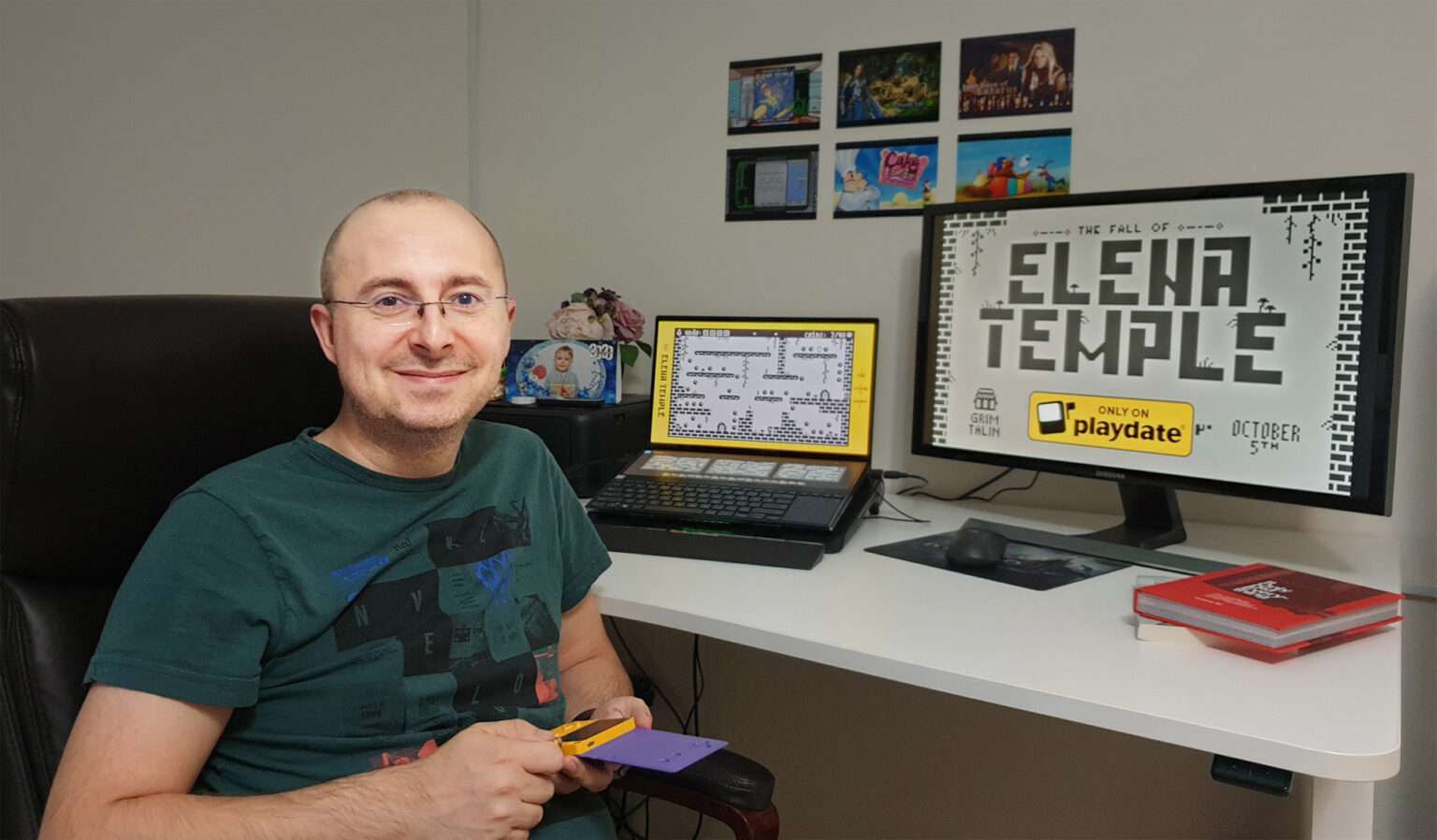Retrolike.net interviews Marcu Catalin about the release of The Fall of Elena Temple and developing for the Playdate.
We are in the midst of the Playdate release of ‘The Fall of Elena Temple,’ the latest project by Marcu Catalin, a solo developer from Romania with almost 17 years of experience in the game development landscape under his belt. After developing on common platforms he has now ventured into the world of Playdate, the little yellow handheld device, perhaps better known for its crank.
Playdate has already stolen the hearts of many critics and players with its diverse game library and an equally diverse community of players and developers. The Playdate has been a huge success. In its first pre-release order cycle, the 20,000 available units sold out in just 20 minutes. The preorders for its second release wave have already reached approximately 58,000 units.
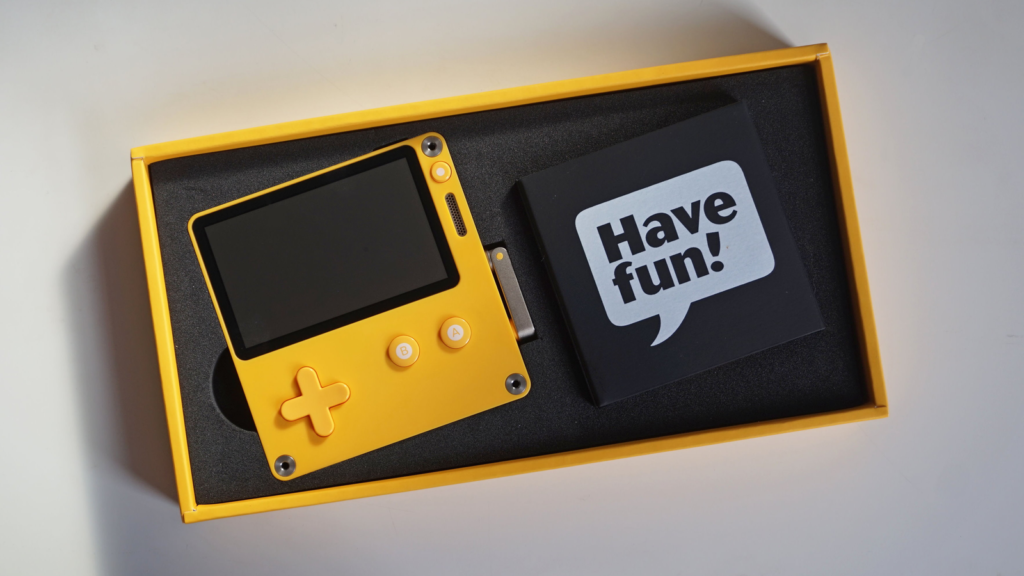
As much as gamers, developers have also flocked to the device because of its accessible and user-friendly SDK and toolset. Its 1-bit graphics, gyroscope, and crank features sets it apart and invites developers to be creative. Some well-known studios like Maddy Makes Games (Celeste), Chubai Labs (Carve Jr.), and a slew of small indie studios and solo developers have started and launched projects on the Playdate’s game “Catalog”.
Going solo
Marcu decided it was time to spread his wings start his own studio after a 10-year stint at the mobile game developer Mobility Games. “We created games in partnership with various clients around the world. One of the most notable collaborations was with Disney Interactive, with whom we worked on our hit success ‘Frozen Free Fall.’ Even before I finished college, I got the job at Mobility Games and just kept making games ever since. After leaving Mobility Games, I started my own tiny studio called GrimTalin and have been making indie games since then, either solo or by partnering up with other like-minded developers.”
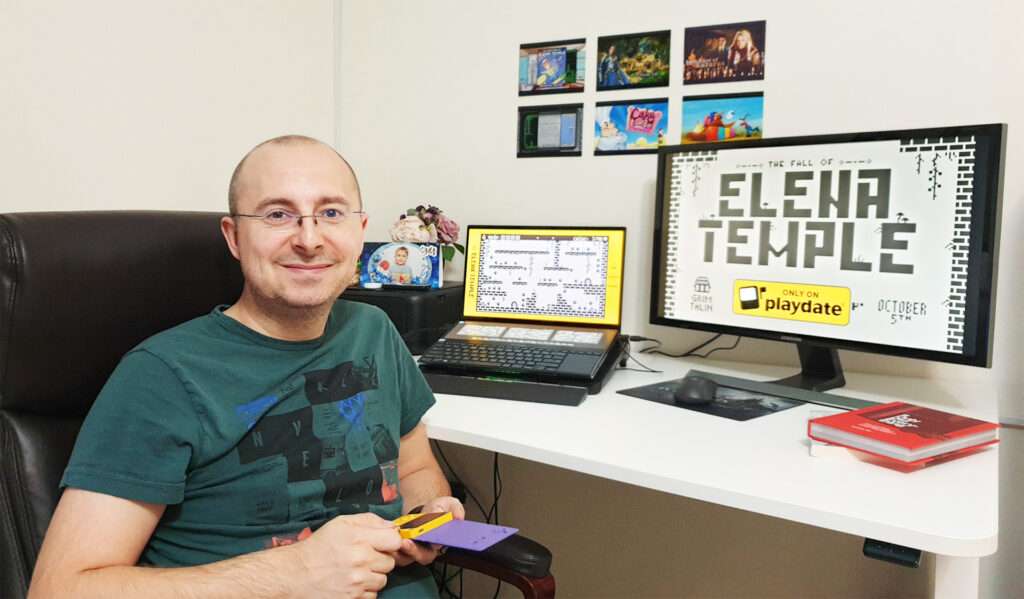
Diverse projects
As a solo developer and co-conspirator, Marcu created, including his latest, four very distinct games, both technically and visually: ‘Last Days of Lazarus,’ ‘Long Ago: A Puzzle Tale,’ and ‘The Adventures of Elena Temple.’ Marcu is very adamant: “One of the driving factors that led me to create my own small studio was the desire for experimentation and creative freedom. I love trying new systems, game genres, and approaches. The Playdate presents another opportunity for creativity,’ Marcu adds. ‘I’ve released games for a variety of platforms, from phones with buttons to current-gen consoles and almost everything in between. Each technology and market is fascinating in its own right, and I love exploring that. I enjoy working within limitations.”
“There are times when I prefer the creative challenges imposed by various boundaries rather than the freedom of current-gen consoles, for example. That’s why I decided to take a short break from the current-gen games I’m currently working on (not yet announced) and give making a game for this quirky little console a try. Everything about it just screams creativity to me, and I wanted to be a small part of that too. It’s been so much fun, both making the game and interacting with the console’s wonderful community. It has been a refreshing experience.”
The Adventures of Elena Temple
“That ‘in-between’ project is ‘The Fall of Elena Temple,’ a follow-up to Marcu’s earlier Steam project, ‘The Adventures of Elena Temple’. It’s Steam page mentions an elaborate history of the games origins of Elena Temple and the obscure home computer it supposedly come out on. Marcu finds it quite amusing that people, including myself, thought this mythological game was actually real.
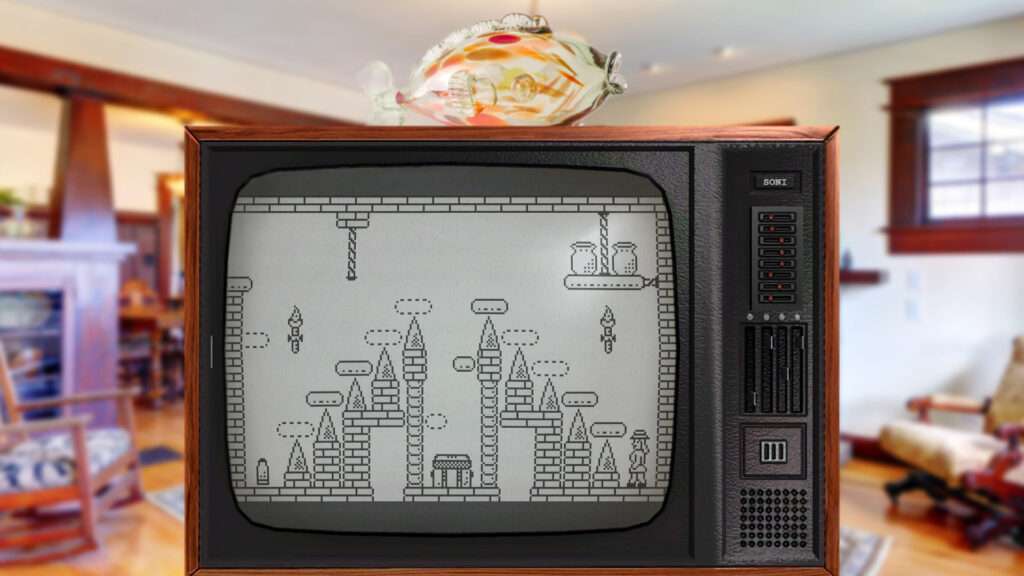
“I love this part, and you’re not the first one to say that. ‘The Adventures of Elena Temple’ is not, in fact, a remake; it’s a brand new game made from scratch by me. However, it’s designed to look and feel like a nostalgic tribute to eighties games, marketed as if it were a forgotten classic brought back to life, with tongue-in-cheek texts describing its many iterations on various systems that never existed.”
Apparently, Marcu wasn’t the only one who enjoyed this approach. “Many players found it funny and enjoyed it, while others went along with it, believing that it really was a game brought back from the past. This probably means I did a decent job emulating those simpler times.”
The Fall of Elena Temple
The Playdate follow up to the Steam game, places Elena, an adventurer in pursuit of treasure, in a massive cave filled with interconnected rooms after she falls through a crevice. To escape, Elena must carefully choose her path, navigating ledges and stalagmites, and collecting all the treasure before progressing to the next room.
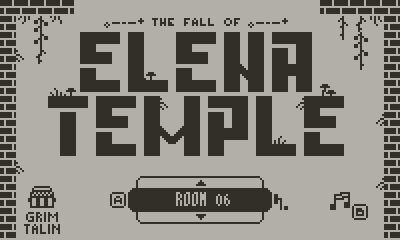
Marcu elaborates on the concept, saying, “As for the crank, I’m fascinated by it and how other developers integrate it into their games. For me, the process was figuring out how the crank would work in an Elena Temple game, a puzzle platformer. That’s how I decided that instead of relying on jumping -as in the first game-, this time your jumps are nearly useless. You don’t start at the bottom and work your way up or jump across gaps; instead, you start at the top or teleport up, and then use falls to collect stuff. How do you get back up? With the crank. Rotate it to go back up, like a rewind/undo/restore, but you keep everything you collected. When I put a limit on how many previous falls you can rewind, it brought up so many puzzle ideas.”
Unique features and mechanics
If I ask whether this game would be different without the crank, Marcu is determined that the game would be totally different. “For my game, the rewind mechanic was inspired by the crank. I wouldn’t have made this game as I did if I hadn’t thought about what would feel natural to use the crank for. Some people asked me to put the rewind on a button because the crank feels a bit cumbersome to use, but to me, that would take a lot of the magic away. It’s not about performing the action in the most unobtrusive way; it’s about the feel of performing the action. During playtests, I could see a smile on everyone’s face the first time they used the crank to rewind. It just has a special feel to it.”
Marcu further emphasizes the crank as a source of creativity rather than a requirement for developing on Playdate: “think the crank is wonderful. I love how more creative developers than me put it to use. I believe it’s a welcome addition to the gaming space, which has been so standardized for so long. While it can be seen as a gimmick at times, or even forced. But that depends on the developer.”
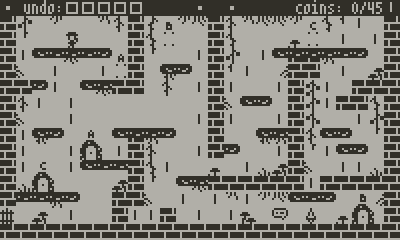
1-Bit toolkit
Besides the Playdate’s very peculiar and unique control mechanic, it introduces another distinctive feature that could be seen as either a limitation or a source of creativity. “I’m a big fan of 1-bit graphics. In fact, I made a game with 1-bit graphics right at the beginning of my indie career. It was the first Elena Temple game, so it felt like a perfect fit to create another game with Elena Temple for a console that exclusively uses 1-bit graphics.”
Thanks to these unique characteristics, the development process and prototyping are managed and organized with the assistance of Panic!’s own development SDK and additional tools, which are built on top of the Lua and C programming languages. One such tool is Pulp, a web-based graphical ‘What-you-see-is-what-you-get’ editor specifically designed for the Playdate. Pulp allows you to script, build, and even create pixel art without ever leaving the web app.
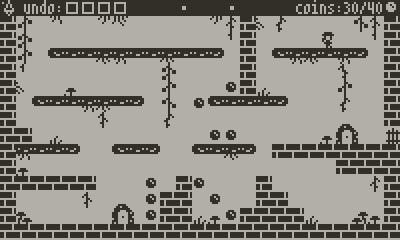
Playdate’s Pulp
Marcu explains, “Pulp is super limited in its capabilities, but at the same time, it’s very comprehensive as long as you can work within its limitations. You need to adapt your mindset to what you can do with it, and that was such a blast for me. The coding language is very basic, so I had to use a lot of ingenuity to make it do what I wanted, but every new feature felt like an achievement. Just like the Playdate, a tiny console that is even cooler than it has any right to be, Pulp surprises you once you embrace it.
I’ve worked with many coding languages, tools, and engines, but this one felt truly different, and that’s what made it even more enjoyable for me. I usually create my games in Unreal or Unity, which are considered ‘big boy engines.’ However, when you strip away all the technical prowess, complex coding, shaders, and everything else, you’re still left with the need for raw creativity. You still need fun mechanics, perhaps some decent writing, and an understanding of core game concepts.”
Embracing its limitations
“With the Playdate, the focus is more on fun and evoking emotions with very few resources, rather than relying on complex worlds, impressive visuals, realistic animations, and characters, and so on. It’s not that one approach is better than the other; it’s just that I embraced this different approach. At least for me, limitations really fuel my creativity.”
Marcu hasn’t ruled out starting another Playdate project. He has picked up his ongoing project in the meantime but wants to reassure Playdate owners, saying, “I’m definitely considering creating more Playdate games, although I don’t have any concrete plans right now. But when I have more time, for sure.”
The Fall of Elena Temple is now available and can be found in the Playdate Catalog, as well as on Itch.io for use with the Playdate Simulator, which is available on Playdate’s website. You can find Marcu on X, Facebook, Youtube, Instagram, and, of course, Itch.io and Steam.


